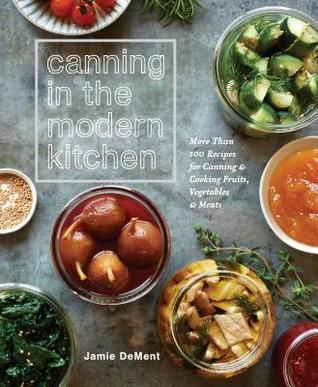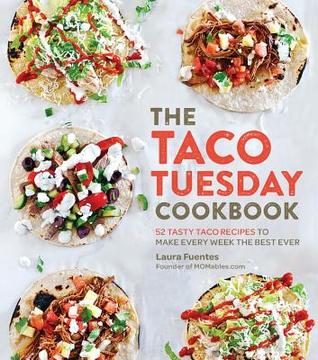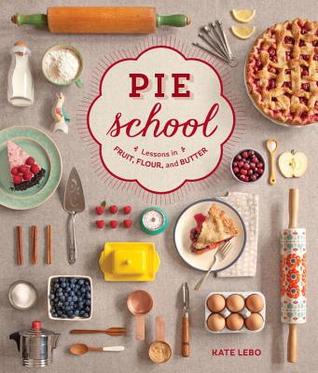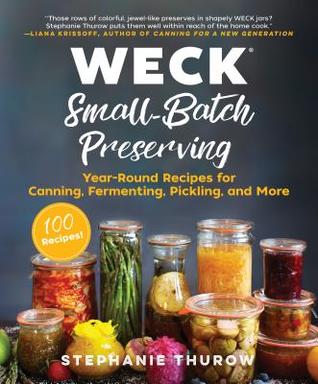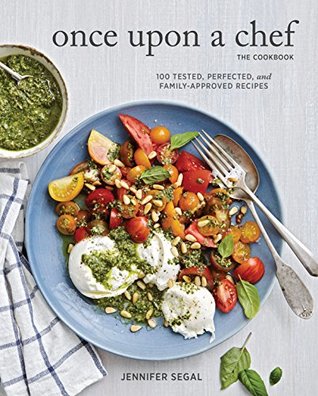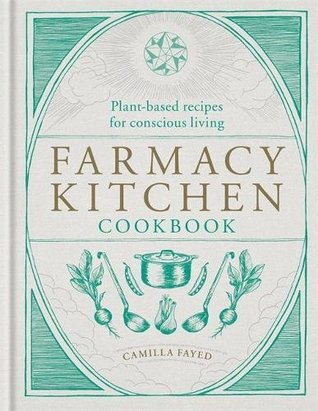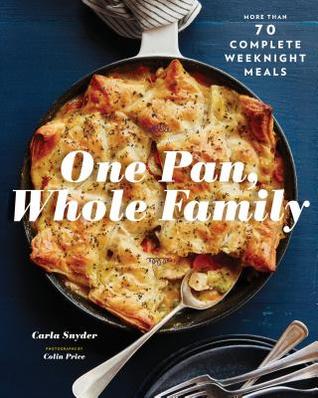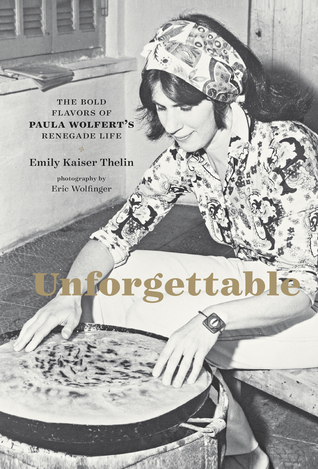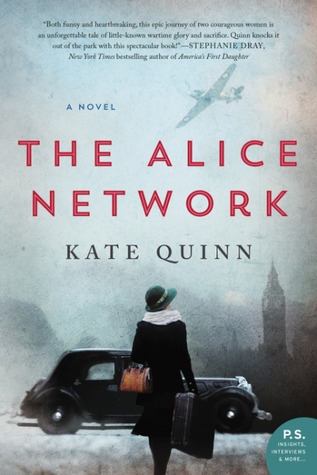Unforgettable: the bold flavors of Paula Wolfert's Renegade Life by Emily Kaiser Thelin
I didn't know what to expect with this book and I will admit I didn't know who Paula Wolfert was either, but after reading this memoir/cookbook I feel like I should have known who she was because she was a pioneer in the food world. The book is organized around her life with recipes at the end of each chapter, but it's not really a cookbook - more of a memoir with recipes included. Wolfert is now suffering from dementia, but cooking and eating bring back many fond memories. Wolfert was living abroad when her husband left her with two young children. She pretty much created a career for herself exposing Americans to, at the time, rare and exotic cuisines. She even worked for Columbia House creating subscribers monthly boxes with recipes and ingredients to create a dinner party with a specific country theme - an idea well ahead of it's time. She would travel to various countries and embed herself with local women and then create a cookbook around that country's cuisine. The author of 9 cookbooks she was the main impetus of bringing now-common ingredients and cuisines to Americans. While the book is huge and the print somewhat small, her story is truly Unforgettable and worth reading.
Some quotes I liked:
"[Columbia Records] The music subscription service was about to launch an epicurean program called International Home Dining. Paula was promptly hired to help run it. A kind of Blue Apron or Sun Basket of its day, the service sent subscribers a box every month or so containing everything they'd need to throw a dinner party from a different country: an album of music from that country (of course), plus a half-dozen illustrated recipes, printed invitations, a four-page newsletter, a battle plan for the cooking, and a half-dozen harder-to-find ingredients and necessary equipment (think a basic cleaver and wok). Each box cost $9.95 plus shipping and handling, about $60.00 in today's dollars - a bargain now but a bit steep in 1969." (p. 61)
Paula embraced technology, "...she developed unparalleled recipes for all of them tailored for the Cuisinart. For years to come, Cuisinart founder Carl Sontheimer sent new models of his machine to Paula from time to time." She also purchased one of the first word processors, "Paula spent $4,000 (about $14,500 in today's dollars) to purchase a Lexoriter from Otterson's husand, who helmed the Lexor Corporation, an early computer company." (p. 120)
"She wished people would be a little bit more willing to cook, if only to preserve all the bounty. She told Edible San Francisco magazine, 'When I lived in Morocco, all summer long people were making food for the winter. That's something that we don't even think about anymore - making jarred food.'" (p. 267)
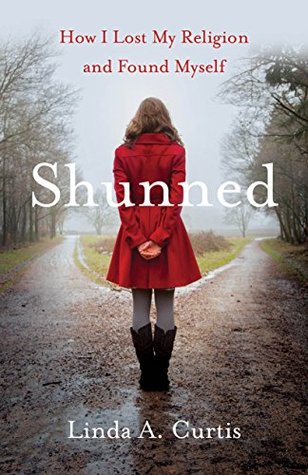
Shunned: how I lost my religion and found myself by Linda A. Curtis
Linda grew up in the Jehovah's Witness religion. From the age of 9 she would go on weekly preaching trips going door to door trying to talk to people about their faith. When she's in her early 30's on one of these weekly preaching trips she shows up at a coworker's door. In doing through her normal spiel she feels like the words are hollow and condescending. That encounter starts the process of Linda leaving the Witness faith. In leaving Linda divorced her husband of almost 10 years and is cut off from everyone in her former life - friends, family, everyone. When you denounce the Witness faith you are "disfellowshipped" or shunned, meaning you are now an evil person and a bad influence so everyone needs to stay away from you. Twelve years after leaving her whole life behind Linda finds out there is a small exception when her father calls to tell her his mother is dying and lets her know she can come see her dying grandmother. That visit allows about 24 hours of normalcy with her immediate family, but then once again cut off until another death.
I personally believe that the Jehovah's Witness faith is a cult and Linda was right to get out of it. But, it was sad to see her go from having faith in God to nothing. She did rebuild her life and find love and happiness, but I guess once you leave a cult it's hard to be able to buy into any other religion. I also found the way her family seemed to allow a "death exception" was so odd - so during that brief time she's not a threat? But the rest of the time she is? Also, her father wasn't a Witness for most of his life only converting shortly before she left the faith. I don't understand why it was OK for her to grow up around her dad who wasn't a Witness, but when she leaves the faith she's totally cut off. Is he seen as a potential convert, but she was in and chose to leave so she's worse? Cults are crazy for a reason. It was a very quick, engaging read, but it was sad and I just felt bad for her that she couldn't see that God is not this cult and still have faith in her life outside of the Witness cult.
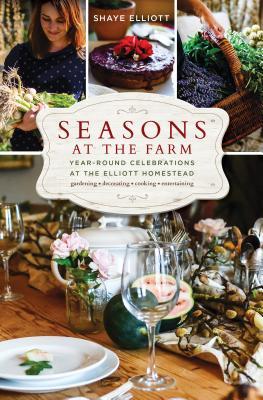
Seasons at the Farm: year-round celebrations at the Elliott homestead by Shaye Elliott
I was expecting more of a cookbook, but this was more of a seasonal look at the Elliott homestead. The book is divided by seasons and each section has sub-sections about the garden during that season, recipes, what's going on in their home, and celebrations. I guess because "celebrations" is in the title I expected more from these sections, but instead of describing specific celebrations it's more about celebrating that season which is more my speed anyway. Overall, it was a nice book with lots of photographs, but I have no idea how she has so much time to spend decorating her house with a farm and 4 kids she's homeschooling. I wasn't sure what to expect, but I did like reading through it and as some other reviews said it did feel like reading through a blog in book format.
The Alice Network by Kate Quinn (Evening Edition book club)
American college student Charlotte "Charlie" St. Clair is pregnant and unmarried and on her way to get an abortion in Europe when she escapes from her mother to try to find her cousin Rose who no one's heard from since the end of WWII. Her search brings her into contact with Eve Gardiner who worked as a spy during WWI and the demons from her time as a spy still haunt her today. These two unlikely allies come together for the common goal of finding Charlie's cousin and also Eve's goal of revenge for someone who betrayed her during her time as a spy.
Eve's story is based on the real Alice Network of spies during WWI and is a MUCH more interesting story. Although I was pretty put off by her basically prostituting herself to get information - I'm sure that did happen, but I wish that hadn't been part of the story here. Charlie's character is basically a spoiled brat who discovered that sleeping around makes her pretty popular - she is not really a sympathetic character at all and her part in this book could have been so much better. I could think of a few different ways to create a fiction book around the real Alice Network that were better than this one. Also for the time period of the two story lines I was really surprised at how much sex and abortion was in the story. But it should make for a good book club discussion. I did like this one better than The Nightingale by Kristen Hannah, but there will never be another war historical fiction book better than All the Light We Cannot See, so everything else just pales in comparison.
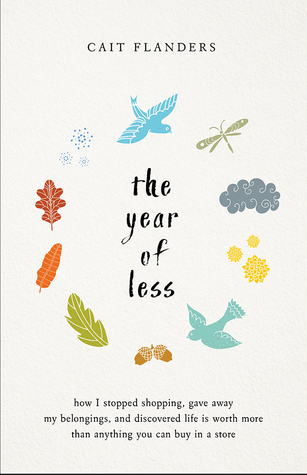
The Year of Less by Cait Flanders
Before the age of 29 Cait Flanders had (finally) stopped drinking and paid off $30,000 in consumer debt. But, as she turned 29 she knew she could do better with her finances so she decided to spend her 29th year in a shopping ban. She could only buy certain things, she could replace something that broke (but only after discarding the original), mostly she could buy consumables - food, gas, etc. Each month she works through not shopping and while it does get easier as she goes along, she had no idea at the beginning of this year that she would face some very difficult times ahead that would seriously try her resolve. But, she did it and even decided to do it for another year. I wasn't familiar with her blog or her really before this book, but I was really in awe of how honest she was about her struggles and opening up about how she used shopping and other consumer-related things to fill voids in her life. I think everyone does that, but not everyone talks about it so honestly. A very inspirational book that shows you can do a lot if you put your mind to it and make yourself accountable.
Some quotes I liked:
[After a breakup] "I felt things and I kept living. I didn't numb myself with food or alcohol. And I didn't shop. It wasn't going to help. It had never actually helped before, and it wasn't going to help this time either...The real thing to celebrate was that I had felt things and I kept living." (p. 49)
"Over the years, I have come to believe there are two types of friends in this world: the friend who will save you from going home with the random person you met at the bar, and the friend who will celebrate your sexual escapade over Bloody Marys the next morning. The one who will never miss a scheduled date to go to the gym, and the one who will congratulate you for eating two cheeseburgers, an order of fries, and a milkshake after a bad day. The one who will stop you from spending $300 on a bag you don't need, and the one who will drive you to the nearest store to buy it." (p. 61)
"I knew I was eating my feelings. I would place the order and walk into the stores knowing I was buying things that would allow me to eat my feelings. I didn't do it every night, and I didn't eat it all in one sitting. These weren't the same binges I'd done before. I didn't want to overdose on cheese or go into a sugar coma. I simply wanted a little comfort, every few days, and finding it in food seemed like the healthiest option." (p. 126)

All We Ever Wanted by Emily Giffin
I had the opportunity to see Emily Giffin on the first stop of this book tour in Charlotte, NC. At the time since the book wasn't technically out yet the talk was more generalities and ideas/themes from the book than specifics. But I remembered part of the talk when I was reading the book and got to the part where Nina sees the white velvet chaise lounge in her bedroom and how ridiculous it is and how it suddenly represents where her life has gone off the rails. Nina married into old Nashville money and lives a very wealthy, pampered life, but she didn't grow up that way and she doesn't want her son Finch to be an entitled brat. Tom lives on "the other side of the tracks" in Nashville and is raising his daughter Lyla as a single father. When Lyla gets a scholarship to Windsor Academy, a prestigious prep school, he thinks they've won the lottery. Then during her sophomore year Lyla and Finch's lives collide and the aftermath fuels gossip and blame all around town. What really happened that night with Lyla and Finch? Has Nina lost the battle over her son? Is Finch really a bad guy or did he make a dumb mistake? In the aftermath of the #metoo movement, Giffin's timely novel explores issues of consent, love, truth, money and power, and relationships. A quick read that will stay with you long after you finish the last page. Another wonderful novel by Emily Giffin!

Living Large in Our Little House by Kerri Fivecoat-Campbell
Kerri Fivecoat-Campbell was unintentionally at the beginning of the tiny house movement. When she was a teenager her parents bought their dream home, but within five years their circumstances had changed so much that they had to sell it. Kerri could see how devastated her mom was to have to sell that house and when Kerri and Dale married they immediately bought a large, split-level house and filled it with new furniture and collections. When they had been married almost 20 years they had the opportunity to build a small lake house on some family land in the Ozark mountains. Their intention was to build a small vacation cottage and later build a larger home to retire to. But, when Dale was laid off at the beginning of the recession in 2007 they realized that financially it made more sense to live in their lake house and sell their house in town. So, out of necessity they started tiny house living in their 480 sq ft cottage that became their full time home with up to 6 dogs at any given time. As they started their journey Kerri discovered the tiny house movement and began to embrace their small house living. They did eventually build Kerri a writing cottage for working out of and also a shed for tools and other equipment. Since then Kerri has connected with many other small house lovers and she shares many of their tips and tricks for living large in a small space. While Kerri and Dale started living tiny out of necessity they both quickly realized this way of life made things so much easier - their expenses were less and they both had more time to pursue their passions. This is a great book if you're interested in possibly downsizing or just want to see other people's tiny home success stories and there are lots of photos as well.

Every Note Played by Lisa Genova
Richard is an accomplished concert pianist when he's diagnosed with ALS. In deep denial at first he tries to go on living a normal life, but his illness progresses quickly and soon he's lost the use of both of his arms. Karina is Richard's ex-wife and said that the day he moved out was the happiest of her life, but when she sees how quickly he is deteriorating she becomes his caregiver and he moves back into the home they shared when they were married. It's obvious that they did not have a good marriage and probably should have never been married. As their background unfolds you see the mistakes they each made in their marriage and in their lives and how it led to this point. Richard is not a sympathetic character for the first half of the book and I was wondering if Genova was ever going to get to the point of reconciliation and forgiveness between Richard, Karina, and Grace, their daughter. Then the last few chapters of the book totally sucker-punched me with how powerfully everything that needed to happen did. Seriously DO NOT read the last 4-5 chapters at work or out in public! I was full on crying for the last 2 chapters.
Genova does an amazing job of describing what it's like to have ALS and to care for someone with ALS. But she also did an amazing job of exploring all the layers of sadness these characters had to work through during the progression of the illness. By the end of the book you feel such sadness for Richard and Karina and see how things could have been different for them. But, you also wonder if they would have been able to change or see things differently outside of this devastating illness. An amazing book about a horrific disease.

Killers of the Flower Moon: the Osage murders and the birth of the FBI by David Grann (Books & Banter book club)
In the 1920's some of the wealthiest people in America were the Osage Indian nation in Oklahoma. Their tribal land was on top of some of the richest oil fields at the time and they could lease out the drilling rights for big money. But soon members of the Osage tribe started dying - some by mysterious illnesses and some by murder. Mollie Burkhart had one sister murdered, another blown up by a bombing, and her mother poisoned. Then some of the people looking into the murders were also murdered or went missing. When the number of Osage deaths reached into the 20's someone contacted the fledgling FBI in Washington, DC. J. Edgar Hoover tasked former Texas Ranger Tom White with solving this case. White used dozens of undercover agents, but also had to constantly fight against widespread corruption, bribery, racism against the Osage, and "good ol' boys" ties within the community. White was able to solve the case, but the master conspirator only spent 20 years in prison before being released, a final favor from his vast network of cronies perhaps. After this Osage "Reign of Terror" was solved many felt like this chapter was closed, but as the author finds out in researching this book there were likely hundreds and hundreds of Osage Indians who's deaths were never investigated and while they weren't part of this one conspiracy, they were still murdered for their money and valuable oil headrights. Just another despicable chapter in the history books of how Native Americans have been treated in this country. A remarkable read that proves the truth is often stranger than fiction.
Some quotes I liked:
"At one congressional hearing, another Osage chief named Bacon Rind testified that the whites had 'bunched us down here in the backwoods, the roughest part of the United States, thinking, 'we will drive these Indians down to where there is a big pile of rocks and put them there in that corner.' 'Now that the pile of rocks had turned out to be worth millions of dollars,' he said, 'everybody wants to get in here and get some of this money.'" (p. 80)
"This so-called Indian business, as White discovered, was an elaborate criminal operation, in which various sectors of society were complicit. The crooked guardians and administrators of Osage estates were typically among the most prominent white citizens: businessmen and ranchers and lawyers and politicians...In 1924, the Indian Rights Association, which defended the interests of indigenous communities, conducted an investigation into what it described as 'an orgy of graft and exploitation.' The group documented how rich Indians in Oklahoma were being 'shamelessly and openly robbed in a scientific and ruthless manner' and how guardianships were 'the plums to be distributed to the faithful friends of the judges as a reward for their support at the polls.'" (p. 155)
[Following the Reign of Terror] "The Osage, meanwhile, had taken their own steps to protect themselves against future plots, persuading Congress to pass a new law. It barred anyone who was not at least half Osage from inheriting headrights from a member of the tribe." (p. 223)
"In 1947, while Earnest was still in jail [for a subsequent crime], Hale was released, having served twenty years at Leavenworth. Parole board officials maintained that their ruling was based on the grounds of Hale's advanced age - he was seventy-two - and his record as a good prisoner. An Osage leader said that Hale 'should have been hanged for his crimes,' and members of the tribe were convinced that the board's decision was the last vestige of Hale's political influence." (p. 248)
"These cases underscored that the murders of the Osage for their headrights were not the result of a single conspiracy orchestrated by Hale. He might have led the bloodiest and longest killing spree. But there were countless other killings - killings that were not included in official estimates and that, unlike the cases of Lewis or Mollie Burkhart's family members, were never investigated or even classified as homicides." (p. 279)
"To get a better sense of the decimation, McAuliffe looked at the Authentic Osage Indian Roll Book, which cites the deaths of many of the original allotted members of the tribe. He writes, 'Over the sixteen year period from 1907 to 1923, 605 Osages died, averaging about 38 per year, an annual death rate of about 19 per 1,000. The national death rate now is 8.5 per 1,000; in the 1920's, when counting methods were not so precise and the statistics were segregated into white and black racial categories, it averaged almost 12 per 1,000 for whites. By all rights, their higher standard of living should have brought the Osages a lower death rate than America's whites. Yet Osages were dying at more than one-and-a-half times the national rate - and those numbers do not include Osages born after 1907 and not listed on the roll.'" (p. 283)
"Garrick Bailey, a leading anthropologist on Osage culture, said to me, 'If Hale had told what he knew, a high percentage of the county's leading citizens would have been in prison.' Indeed, virtually every element of society was complicit in the murderous system. Which is why just about any member of this society might have been responsible for the murder of McBride, in Washington: he threatened to bring down not only Hale but a vast criminal operation that was reaping millions and millions of dollars." (p. 291)
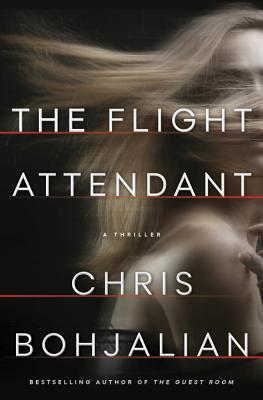
The Flight Attendant by Chris Bohjalian (Evening Edition book club)
** spoiler alert ** Cassie Bowden is a flight attendant with a drinking problem. Her life revolves around getting blackout drunk and sleeping with random men - often in cities around the world thanks to her work. One morning Cassie wakes up in a strange hotel room, but this time the man in the bed beside her is dead. Making the split second decision to flee without contacting authorities, Cassie has to decide whether to tell the truth or not and what the consequences of her decision might be.
Chris Bohjalian is kind of hit or miss for me with his books and this one was a huge miss. The storyline is so ridiculous that it's barely believable as you're reading. Also, the fact that a train wreck of a person like Cassie Bowden would suddenly realize she's being followed is even more ridiculous. But, what takes the ridiculous cake is the end with Cassie now working as a spy for the Russians and that's AFTER she had a baby from her encounter with the dead guy in the UAE. Really?! This story was just ridiculous.
